|
|
|
Sort Order |
|
|
|
Items / Page
|
|
|
|
|
|
|
| Srl | Item |
| 1 |
ID:
167369
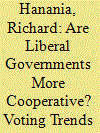

|
|
|
|
|
| Summary/Abstract |
Among both elites and the mass public, conservatives and liberal differ in their foreign policy preferences. Relatively little effort, however, has been put toward showing that, beyond the use of force, these differences affect the day-to-day outputs and processes of foreign policy. This article uses United Nations voting data from 1946 to 2008 of the five major Anglophone democracies of the United States, the United Kingdom, Canada, Australia, and New Zealand to show that each of these countries votes more in line with the rest of the world when liberals are in power. This can be explained by ideological differences between conservatives and liberals and the ways in which the socializing power of international institutions interact with preexisting ideologies. The results hope to encourage more research into the ways in which ideological differences among the masses and elites translate into differences in foreign policy goals and practices across governments.
|
|
|
|
|
|
|
|
|
|
|
|
|
|
|
|
| 2 |
ID:
167375
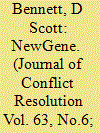

|
|
|
|
|
| Summary/Abstract |
This article introduces NewGene, a complete redesign of the popular EUGene software. Like its predecessor, NewGene is designed to eliminate many of the difficulties commonly involved in constructing large international relations data sets. NewGene is a stand-alone Microsoft Windows and OSx-based program for the construction of annual, monthly, and daily data sets for a variety of decision-making units (e.g., countries, leaders, organizations) used in quantitative studies of international relations. It also provides users the ability to construct units of analysis ranging from monads (e.g., country-year), to dyads (e.g., country1-country2-year), to extra-dyadic observations called k-ads (e.g., country1-country2-year,…, -countryk-year). NewGene’s purpose is to provide a highly flexible platform on which users can construct data sets for international relations research using preloaded data or by incorporating their own data. The software is freely available at http://www.newgenesoftware.org/.
|
|
|
|
|
|
|
|
|
|
|
|
|
|
|
|
| 3 |
ID:
167368
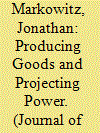

|
|
|
|
|
| Summary/Abstract |
How does a state’s source of wealth condition the domain in which it seeks to project influence? We argue that what a state makes conditions what they take. Specifically, the less states rely on land rents to acquire wealth, the less interested they will be in seeking control over territory and the more interested they will be in securing access to distant markets. We develop and test several observable implications that should follow whether this proposition is true. First, as states become less economically dependent on territory, they should be less likely to fight over territory; second, those states should be more likely to both invest in power projection capabilities and subsequently project power at greater distances. Our findings support our theory. These results are robust across a variety of model specifications that take into account potential confounds, such as regime type, economic development, threat, and geography.
|
|
|
|
|
|
|
|
|
|
|
|
|
|
|
|
| 4 |
ID:
167370
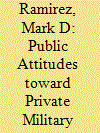

|
|
|
|
|
| Summary/Abstract |
This article examines the distribution and correlates of mass attitudes toward the privatization of US military operations. Relying on insights from principal–agent theory, we form predictions about what beliefs are associated with a willingness to grant authority over military operations to private military companies (PMCs). The model predicts that citizens’ beliefs about actor motives, accountability, and costs are associated with attitudes toward PMCs. Using a nationally representative survey, we find that beliefs about the profit-oriented motives of private firms and perceptions of their lack of accountability reduce support for the use of PMCs, particularly in combat operations. By contrast, belief in private firms’ superior fiscal efficiency increases support for utilizing PMCs in both combat and noncombat operations. The results illustrate the usefulness of principle-agent theory for understanding mass attitudes and help to improve the field’s understanding of the contours of public attitudes toward US defense policy.
|
|
|
|
|
|
|
|
|
|
|
|
|
|
|
|
| 5 |
ID:
167374
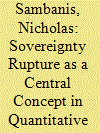

|
|
|
|
|
| Summary/Abstract |
Empirical studies of the causes or consequences of civil war often use measures that do not correspond to theory and results are sensitive to small changes in the coding of civil wars. Civil war is an instance of “sovereignty rupture” and is inherently a polity-level phenomenon, but that understanding of civil war is not reflected in data in which civil war is coded as a dyadic conflict—the state fighting a domestic challenger. We demonstrate the consequences of conceptual ambiguity about which conflicts to code as civil war and when to code the start and end of a civil war. Using a new data set of civil wars from 1945 to 2016 that is consistent with the concept of sovereignty rupture, we replicate several studies and find that their results are often overturned or weakened when we use our data. We advocate for greater deliberateness in data selection in civil war studies, focusing on the fit between the question of interest and the concept of civil war that is underlying a given data set.
|
|
|
|
|
|
|
|
|
|
|
|
|
|
|
|
| 6 |
ID:
167373


|
|
|
|
|
| Summary/Abstract |
In many ethnically segregated countries, policy is directly linked to ethnicity, and thus, nonruling ethnic groups may suffer from the implemented policy. For these groups, a secession is one instrument to eliminate ethnic heterogeneity costs by implementing their own policy. However, leaving the country reduces economies of scale in the public good provision. Therefore, separatist ethnic groups face a trade-off between eliminating ethnic heterogeneity costs and losing economies of scale in the provision of public goods. I present a model for unraveling secessions in an ethnically segregated country. I use this model to derive conditions for the breakup of countries and to compare equilibrium behavior with and without the possibility of a consecutive secession. Among others, I find that a secessionist conflict will be more likely if there is a previous secession. Furthermore, aggregated conflict spending is larger in secessions with the possibility of a consecutive conflict.
|
|
|
|
|
|
|
|
|
|
|
|
|
|
|
|
| 7 |
ID:
167371


|
|
|
|
|
| Summary/Abstract |
Why do civilians in warzones often hold widely divergent beliefs about what is happening in the fighting? While there is a burgeoning literature on the micro-dynamics of armed conflict, variation in civilians’ factual beliefs has received scant attention. Yet such beliefs are critical, as they form the basis for wartime opinion and action. I argue that—particularly for civilians outside the direct “line of fire”—this variation comes not chiefly from an event’s empirical nature, but from civilians’ prior political orientations in the dispute. In order to investigate these dynamics, I fielded a survey experiment in Pakistan in which I manipulated the features of a reported counterinsurgent air strike and then measured civilians’ ensuing beliefs about it. The results show that these beliefs are most driven by the perpetrator’s identity and civilians’ own preexisting attachments. While actual casualty levels matter too, these findings suggest that civilians’ beliefs about conflict events are often deeply biased in nature.
|
|
|
|
|
|
|
|
|
|
|
|
|
|
|
|
| 8 |
ID:
167372


|
|
|
|
|
| Summary/Abstract |
Autocratic governments hold a preference for opacity. Autocracies are less transparent than democracies and a closed informational environment preserves autocratic regimes from mass unrest. Yet, autocracies vary widely in the extent to which they disclose economic information. In this article, we offer an explanation for why some autocrats choose to disclose. We contend that, paradoxically, some autocratic leaders may benefit from increasing the capacity of the populace to mobilize. In so doing, autocratic leaders threaten rival members of the elite, reducing the risk of elite challenges and increasing their freedom of maneuver. We contend that transparency acts as one mechanism toward these ends. We formalize these intuitions and demonstrate empirically that leaders in transparent autocracies enjoy a reduced hazard of removal via coup relative to their opaque counterparts. Personalistic dictators and entrenched autocrats—who suffer the smallest risk of sanctioning by their elites—are particularly unlikely to disclose information.
|
|
|
|
|
|
|
|
|
|
|
|
|
|
|
|
|
|
|
|
|